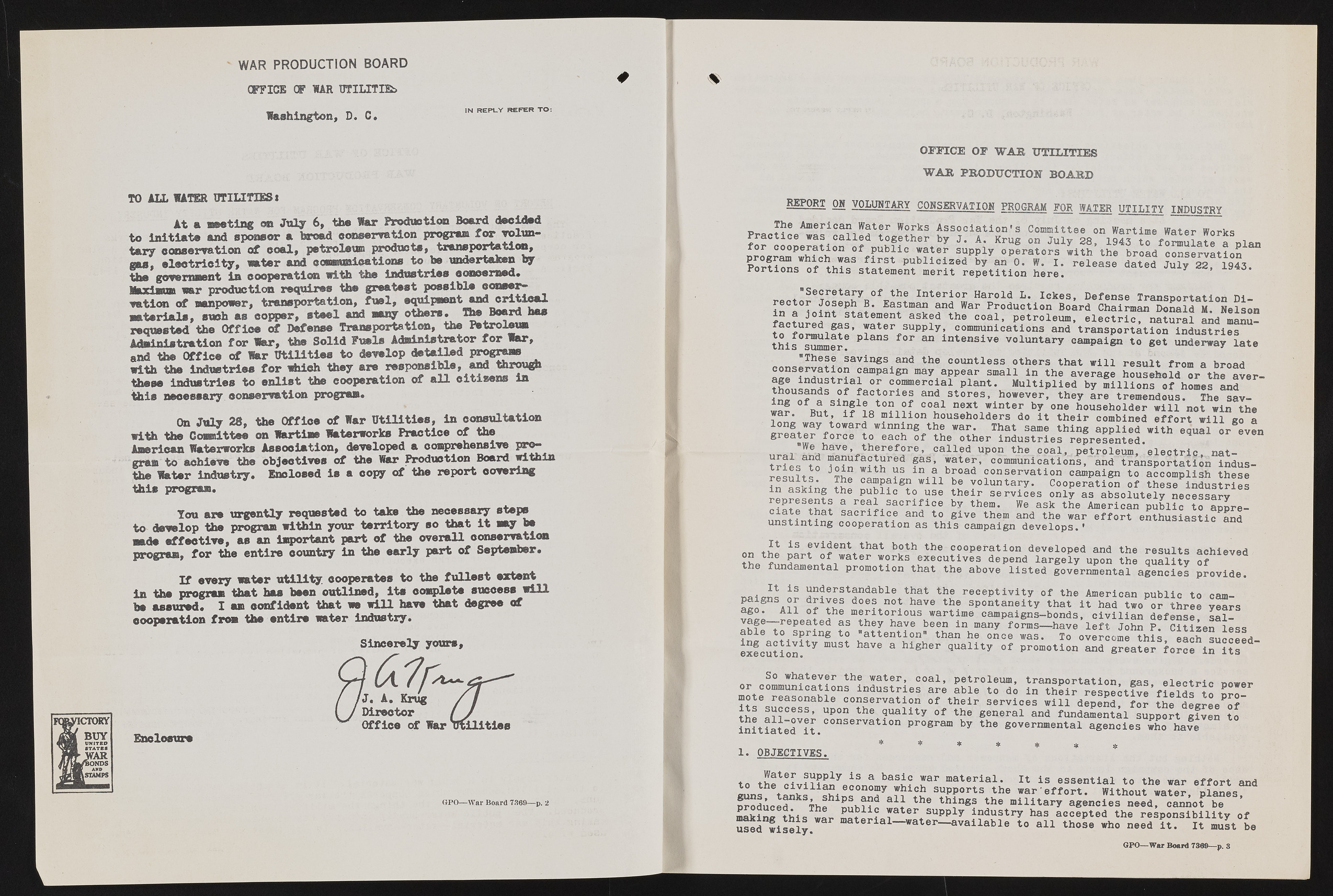Copyright & Fair-use Agreement
UNLV Special Collections provides copies of materials to facilitate private study, scholarship, or research. Material not in the public domain may be used according to fair use of copyrighted materials as defined by copyright law. Please cite us.
Please note that UNLV may not own the copyright to these materials and cannot provide permission to publish or distribute materials when UNLV is not the copyright holder. The user is solely responsible for determining the copyright status of materials and obtaining permission to use material from the copyright holder and for determining whether any permissions relating to any other rights are necessary for the intended use, and for obtaining all required permissions beyond that allowed by fair use.
Read more about our reproduction and use policy.
I agree.Information
Digital ID
Permalink
Details
Member of
More Info
Rights
Digital Provenance
Publisher
Transcription
WAR PRODUCTION BOARD OFFICE OF WAR UTILITIES Washington, D. C. in reply ^ to, TO ALL WATER UTILITIES* At a seating on July 6, the War Production Board decidad to initiate and sponsor a broad conservation program for voluntary conservation of coal, petroleum products, transportation, gas, electricity, mater and ccesaualcations to be undertaken by the government in cooperation with the industries concerned. Maximum ear production requires the greatest possible conser- vation of manpower, transportation, fuel, equipment and critical materials, such as copper, steel and many others. The Board has requested the Office of Defense Transportation, the Petroleum Administration for War, the Solid Fuels Administrator for War, and the Office of War Utilities to develop detailed programs with the industries for shich they are responsible, and through these industries to enlist the cooperation of all citizens in this necessary conservation program. On July 28, the Office of War Utilities, in consultation with the Committee on Wartime Waterworks Practice of the American Waterworks Association, developed a comprehensive program to achieve the objectives of the War Production Board within the Water industry. Enclosed is a copy of the report covering this program. You are urgently requested to take the necessary steps to develop the program within your territory so that it may be made effective, as an important part of the overall conservation program, for the entire country in the early part of September. If every water utility cooperates to the fullest extent in the program that has been outlined, its complete success mill be assured. I am confident that me mill have that degree of cooperation from the entire water industry. Sincerely yours, GPO—War Board 7369—p. 2 OFFICE OF WAR UTILITIES WAR PRODUCTION' BOARD — voluntary conservation program for water utility industry American Water Works Association's Committee on Wartime Water Works Practice was called together by J. A. Krug on July 28, 1943 to formulate anlan of public water supply operators with the broad conservation Pott{lrst Publicized by an 0. W. 1. release dated July 22 1943. Portions of this statement merit repetition here. Secretary of the Interior Harold L. Ickes, Defense Transportation Di- SmIIIM ?* Eastman and War Production Board Chairman DoSald M. Nelson state“ent asked the coal, petroleum, electric, natural and manufactured gas, water supply, communications and transportation industries this s^r? PlaDS f°r an intenSlVe votary campaign to ge? SS^ygte "These savings and the countless others that will result from a broad conservation campaign may appear small in the average household or the average industrial or commercial plant. Multiplied by millions of homes and thousands of factories ani stores, ho.evor, they Le trewodlj,. in? BmBh9HHP °°s1 HE-S ,Tj3wS bY one householder win not win the B * if “ilJlion householders do it their combined effort will go a long way toward winning the war. That same thing applied with equal or even greater force to each of the other industries represented. nr-fliT^haQe,Y-thfrefjre’ called upon the coal, petroleum, electric, nat- ?d “aaufactured gas, water, communications, and transportation indus- Wlth as in a broad conservation campaign to accomplish these in asking the nub?frS? Wl11 H yoluntary- Cooperation of these industries in asking the public to use their services only as absolutely necessarv B3BS Lrea^SaCri^?e by them* We ask the American public to appre- mmm sacrifi.c.e and t0 glve them and the war effort enthusiasticand unstinting cooperation as this campaign develops.' nn lH evident that both the cooperation developed and the results achieved of water works executives depend largely upon the quality of the fundamental promotion that the above listed governmental agencies provide. “ *s understandable that the receptivity of the American public to cam- All does not have the spontaneity that it had two or three years ago. All of the meritorious wartime campaigns-bonds, civilian defense sal- vage repeated as they have been in many forms—have left John P. Citizen less .spfing ho "attention" than he once was. To overcome this, each succeed- executiin*17 “USt haVe 3 hlgher quality of promotion and greater force in its So whatever the water, coal, petroleum, transportation, gas electric newer or communications industries are able to do in their respective fields I ??be_.reasonable conservation of their services will depend, for the degree^f the aliCnve’ Up0n the.<?uality of tbe general and fundamental support gKen to initiated it. nSerVatl°n program by the governmental agencies who have ******* 1. OBJECTIVES. to HBB asv- "ar material* It is essential to the war effort and «unsh t^ks Ahinran^aT?^? sypports the war'effort. Without water, planes, Soduced Th? ali the thdngs the military agencies need, cannot be Lh™ thieTh public water supply industry has accepted the responsibility of SSd Wisely. material water available to all those who need it. It must be GPO— War Board 7360—p. 3

